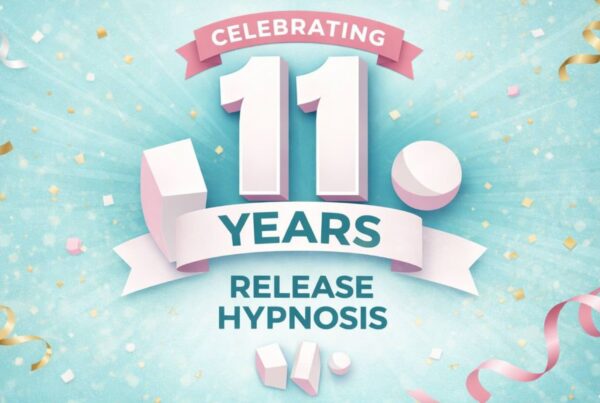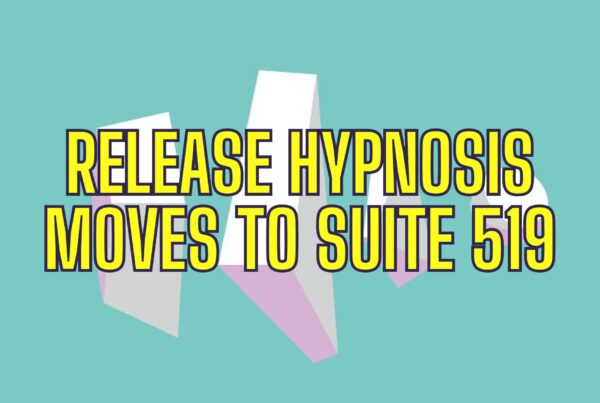Hypnosis and ADHD: Can People Living with ADHD Be Good Hypnotic Subjects?
Over the past few years, the number of people who come in for therapy and who state that they’re living with ADHD has increased. This creates an interesting question about how living with ADHD might impact on how they might be as a hypnotic subject. ADHD, or Attention Deficit Hyperactivity Disorder, is often associated with restlessness, impulsivity, and difficulty maintaining focus. These traits may seem, at first glance, incompatible with the deep focus and stillness usually associated with hypnosis. Yet recent studies suggest that people living with ADHD can, under the right conditions, become highly responsive hypnotic subjects.
Research indicates that the cognitive traits typically linked to ADHD—such as heightened imagination, emotional sensitivity, and moments of intense hyperfocus—can actually enhance hypnotic responsiveness. This opens the door to a more inclusive and adaptive understanding of how hypnosis might support individuals with ADHD, not only in managing symptoms but also in harnessing their natural strengths.
The Misconception: “ADHD Can’t Focus—So Hypnosis Won’t Work”
A common misunderstanding about ADHD is that it represents a total inability to concentrate. In truth, attention in ADHD is variable, not absent. Individuals with ADHD often experience hyperfocus—an intense form of concentration on activities that deeply interest them. This focused absorption is remarkably similar to a hypnotic state, where the mind becomes attuned to inner experiences while filtering out external distractions.
Because of this, the assumption that people with ADHD cannot be hypnotised is increasingly being challenged. In fact, emerging evidence suggests that their tendency to become absorbed in internal experiences like daydreams, visualisations, and creative thought may make them more open to hypnotic suggestion—especially when sessions are designed with their unique cognitive rhythms in mind.
Hypnotisability in ADHD: What the Research Says
Multiple studies have examined how individuals with ADHD respond to hypnosis. The results are not only encouraging but also intriguing. One study using the Continuous Performance Test (CPT)—a task designed to measure attention and impulsivity—found that hypnotic suggestions improved reaction times and accuracy in both ADHD and non-ADHD participants. This suggests that people with ADHD are not just capable of hypnosis but can benefit cognitively from it as well.
Interestingly, individuals with ADHD often showed unique patterns of response. After a hypnotic induction, they tended to display faster reaction times and improved focus. While their attentional system may operate differently from neurotypical individuals, this doesn’t appear to make them less hypnotisable. In many cases, their suggestibility is comparable, and sometimes even enhanced, depending on the nature of the hypnotic intervention.
Traits That Support Hypnotic Responsiveness in ADHD
When we consider what makes someone a good hypnotic subject, traits such as creativity, imagination, emotional openness, and a willingness to engage in inner experience often come to the forefront. People with ADHD frequently demonstrate these traits in abundance. Their active minds, rich inner lives, and responsiveness to novelty can all serve as advantages in a hypnotic setting.
In addition, their frequent experience of spontaneous trance-like states—whether through intense daydreaming or getting “lost” in stimulating activities—suggests a natural predisposition to the trance state. Hypnosis, at its core, is a process of guiding someone into a focused and receptive state of awareness. For individuals with ADHD, this can feel quite familiar, especially when the hypnotic process aligns with their neurological style.
Making Hypnotherapy ADHD-Friendly: Tailoring the Approach
The key to effective hypnosis and ADHD work lies in how the process is structured. Traditional, long-form inductions that rely on sustained stillness and prolonged concentration may not be ideal. Instead, sessions should be tailored to match the client’s attention span, preferences, and sensory needs. This might involve using shorter, more engaging segments, or allowing movement and fidgeting as part of the experience.
In fact, some hypnotherapists report better results when ADHD clients are encouraged to interact during sessions. Whether through guided imagery that taps into their specific interests or techniques like conversational hypnosis that engage them actively, flexibility is crucial. Hypnotherapy becomes most effective when it adapts to the client—not when the client is forced to adapt to a rigid protocol.
Movement and Fidgeting: Integrating Rather Than Suppressing
Another essential adaptation is allowing physical movement. Individuals with ADHD often find it hard to remain still, and attempts to suppress this tendency can create unnecessary tension. Fortunately, hypnosis doesn’t require immobility. Fidgeting, rocking, or even using objects like stress balls or weighted blankets can be incorporated without diminishing the hypnotic effect.
In fact, subtle movement can become a bridge into deeper trance. A gentle rhythm of movement, when acknowledged and welcomed, can enhance relaxation and absorption. By integrating rather than resisting the body’s natural impulses, the hypnotic experience becomes more authentic and comfortable for those with ADHD.
Fast-Paced Techniques That Capture Attention
Fast-paced or multi-sensory hypnotic techniques are often better suited to ADHD clients. Visualisations that are rich in colour and action, inductions that involve rhythm or music, and metaphors that stimulate imagination can all help maintain engagement. The goal is to meet the brain where it is—fast, dynamic, and hungry for novelty—and guide it gently into a more focused, receptive space.
Some therapists also find success with eye-fixation methods, NLP-based approaches, or kinaesthetic inductions that involve touch, breath, or posture. These methods can help bypass resistance by giving the ADHD brain something to do, rather than asking it to “shut off.” Engagement, not suppression, is the name of the game.
Therapeutic Uses: Addressing ADHD Symptoms with Hypnosis
The potential therapeutic benefits of hypnosis for ADHD are broad and promising. Hypnosis has been used to support behavioural regulation, improve sleep, enhance focus, and reduce anxiety—challenges that often accompany ADHD. By using suggestions designed to reinforce calm, confidence, and clarity, individuals may develop new patterns of response that support their daily functioning.
Hypnosis can also help manage co-occurring difficulties, such as emotional regulation and low self-esteem. Because the hypnotic state allows access to the subconscious, it creates a powerful opportunity to plant new beliefs and behavioural strategies that align with the client’s goals. While more research is still needed, early findings suggest that these interventions can offer lasting change—especially when part of a broader, integrative approach.
Hypnotherapy Versus CBT: How Do They Compare?
Cognitive Behavioural Therapy (CBT) is often considered a gold standard in ADHD treatment. However, comparisons between CBT and hypnosis show that the latter may offer unique, long-term advantages. In some studies, hypnosis produced sustained improvements in attention and emotional regulation that outlasted the immediate treatment window. This is especially valuable for individuals seeking tools that reinforce their own inner resources.
CBT focuses on conscious thought patterns, whereas hypnosis works at the level of subconscious beliefs and automatic responses. For people with ADHD—who often struggle with executive functioning—bypassing the analytical mind and going straight to deeper layers of awareness can make therapeutic change feel more natural and effortless. Rather than replacing CBT, hypnosis can be an excellent complement to it.
ADHD Medication and Hypnosis: Friends or Foes?
One intriguing area of research explores how stimulant medication—commonly prescribed for ADHD—might interact with hypnotisability. Some early findings suggest that medication may enhance responsiveness to hypnosis, potentially by stabilising attention and reducing mental distractions. This combination could lead to better outcomes when both approaches are used mindfully and collaboratively.
However, it’s important to note that not all clients respond to medication in the same way. Some may prefer to explore hypnosis as a natural alternative, especially if they experience side effects from pharmaceuticals. As always, individual preferences, needs, and medical guidance should shape the course of treatment. But the compatibility of medication and hypnosis opens exciting possibilities for hybrid care models in the future.
Working with Children and Adolescents with ADHD
Children and teens with ADHD are often especially receptive to hypnosis when it is presented in a fun, imaginative, and interactive way. Storytelling, metaphor, and visualisation are powerful tools for engaging younger clients. In fact, many naturally slip into trance-like states during play or focused activity, making hypnosis a seamless extension of their daily experience.
Therapists working with this population should emphasise creativity and empowerment. Rather than focusing on “fixing” the child, hypnosis can be used to highlight strengths, reinforce helpful habits, and nurture emotional resilience. Parents can also be involved, learning techniques to support their child at home. This collaborative approach helps make the process feel positive, supportive, and developmentally appropriate.
A Neurodiversity-Informed Perspective
Understanding ADHD through the lens of neurodiversity helps to reframe how we approach hypnosis. Instead of seeing ADHD traits as barriers, we can recognise them as different modes of attention and engagement. This shift encourages therapists to drop a one-size-fits-all approach and embrace flexible, responsive methods that honour the individual’s way of being in the world.
Neurodivergent minds often thrive when given the freedom to explore at their own pace and in their own style. Hypnosis, when tailored accordingly, can be an empowering and validating experience. It becomes less about changing who someone is and more about helping them access the inner strengths that are already there—waiting to be uncovered.
Hypnosis and ADHD—A Natural Fit?
The relationship between hypnosis and ADHD may not be what we initially expect, but it is full of rich potential. Far from being incompatible, the traits that define ADHD can often enhance hypnotic responsiveness when understood and supported appropriately. From creative engagement to intense internal focus, people with ADHD possess many qualities that make them excellent candidates for hypnosis.
As research continues to evolve, the therapeutic community is discovering new ways to adapt hypnosis for neurodivergent individuals. Whether used as a standalone intervention or alongside other treatments like CBT and medication, hypnosis offers a personalised and effective way to promote focus, calm, and wellbeing. For individuals living with ADHD—and the therapists who support them—this is a promising avenue worth exploring.
Release Hypnosis Melbourne Hypnotherapy
Since 2015, Lawrence Akers has been working under the name Release Hypnosis offering Hypnotherapy and ACT based work to the people of Melbourne or an online service. Based on St Kilda Rd, Release Hypnosis is an easy and convenient location to get to and accessible by the ANZAC station train and tram stop. Release Hypnosis can help with a wide range of presenting issues, and I offer a free 30 minute no obligation discovery call for those who are unsure if hypnotherapy is the right way forward for them.
Book Your FREE 30 Minute Consultation With Release Hypnosis NOW!
You may also like to read:
Hypnotherapy: A Guide to Healing Through the Subconscious
The Neuroscience of Gratitude and Effects on the Brain: Unlocking Mental Resilience
What Is The Success Rate of Hypnosis?








